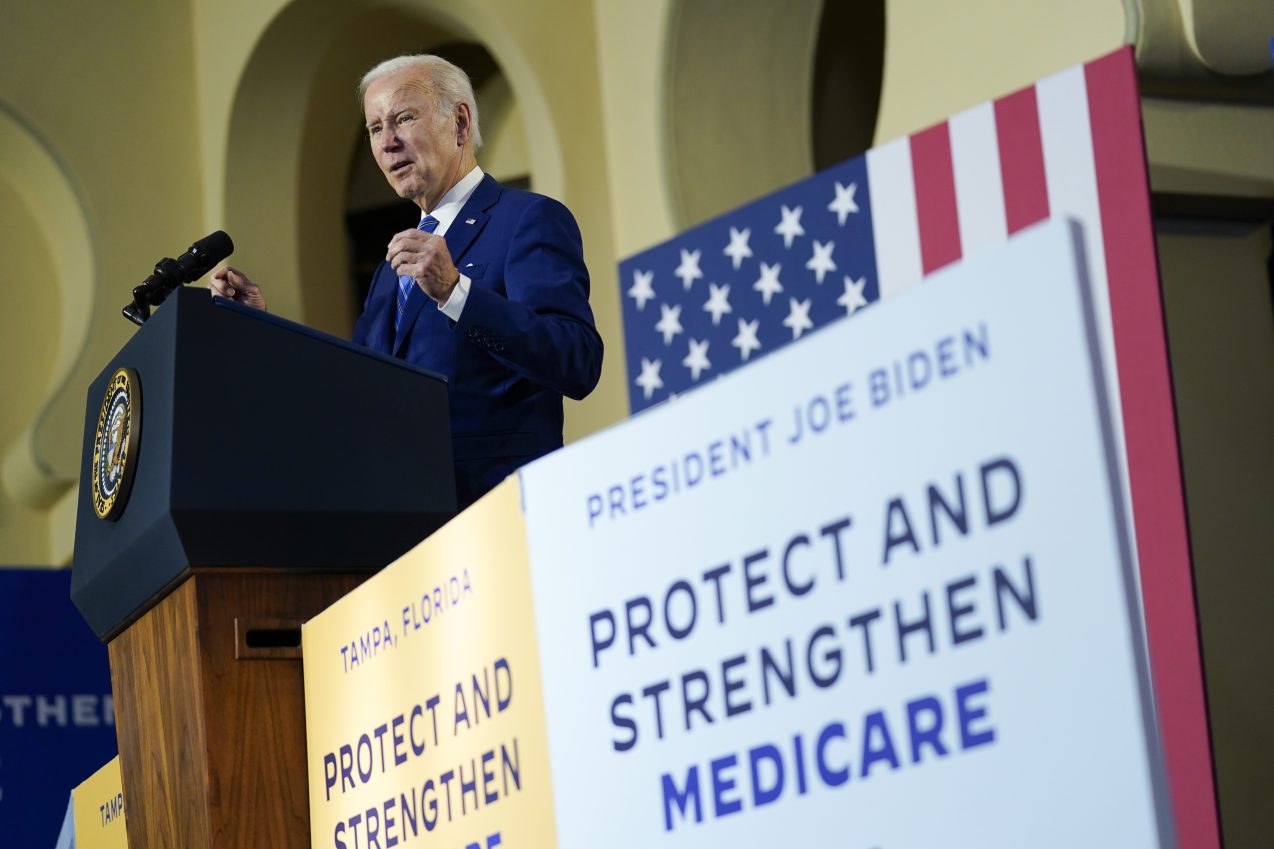WASHINGTON (AP) — President Joe Biden is trumpeting Medicare's new powers to negotiate directly with drugmakers on the cost of prescription medications — but a poll shows that any immediate political boost that Biden gets for enacting the overwhelmingly popular policy may be limited.
Three-quarters of Americans, or 76%, favor allowing the federal health care program for the elderly to negotiate prices for certain prescription drugs. That includes strong majorities of Democrats (86%) and Republicans (66%), according to a new poll from The Associated Press-NORC Center for Public Affairs Research. About one in five Americans are neutral on the issue, while 6% outright oppose it.
But the poll shows Biden's approval rating, at 40%, is about where it's been for the last year. Americans are split on how the Democratic president is handling the issue of prescription drug prices — 48% approve, making it a relative strong point for him, but 50% disapprove.
Seven in 10 Democrats approve of how Biden is handling the issue of prescription drug prices, compared to about a third of independents and about a quarter of Republicans. Even so, Republicans are still much more likely to approve of how Biden is handling prescription drug prices than they are to approve of his job efforts overall (8%).

Even among the Americans who support allowing Medicare to negotiate drug prices, approval of Biden’s handling of the issue remains relatively tepid. A slim majority (55%) approve, but 43% disapprove.
Interviews with poll respondents suggest that from conservative-leaning to liberal voters, Americans want the federal government to be more aggressive on negotiating drug prices with pharmaceutical companies in order to lower medication costs. The gap between those who support the new Medicare policy — a long-sought goal of various presidents and lawmakers — and those who approve of Biden's handling of the issue also suggests the administration continues to struggle to connect the White House's accomplishments to Biden's personal popularity as he readies a reelection bid.
That challenge is even more critical because the core of Biden's reelection pitch to voters is selling his legislative achievements and showing that he is a leader who has accomplished for Americans where other presidents had fallen short, such as giving Medicare negotiating powers and enacting a massive bipartisan infrastructure law.
Esperanza Baeza, a teacher's assistant in Chicago, said she was recently prescribed medication that was prohibitively expensive, and she had to comparison shop before she found drugs that were relatively affordable. She said while she understood that presidents can't fix all problems, she wondered whether Biden was doing enough on the issue of drug pricing.
Told about Medicare's new authority to negotiate with pharmaceutical companies, Baeza, a Democrat, responded, “That's awesome."
“I'm 55. I know pretty soon, I'm retiring,” she said. “I would like to educate myself more on that and I'm hoping I don't have to struggle with that once I retire.”
The new price negotiations come from a provision of the Inflation Reduction Act, a package of Democratic priorities signed into law last year that focuses largely on climate and health care policies. The White House last month formally rolled out the first 10 drugs that Medicare will negotiate on, which include the blood thinner Eliquis and Jardiance, a diabetes treatment.
“For years, Big Pharma blocked this,” Biden said during an East Room event marking the announcement. "They kept prescription drug prices high to increase their profits. They extended patents on existing drugs to suppress fair competition instead of innovating, playing games with pricing so they could charge whatever they can.
“But this is — finally, finally, finally, we had enough votes, by a matter of one, to beat Big Pharma,” he continued. “Well, we did it.”
Ellen Daily, a 73-year-old retiree in Carrollton, Texas, said she strongly favors allowing Medicare to negotiate on drug prices. Both she and her husband are on the federal health program. But Daily, who said she disapproves of Biden's overall job performance, said the president's role in unlocking that authority for Medicare was not enough to change her outlook on him.
“They only negotiated on 10 drugs," said Daily, who said she is a political independent and holds fiscally conservative views. “It should've been across the board; every one of the drugs that Medicare pays for should be negotiated."
It will take three years for the lower prices for the 10 drugs to go into effect, and the industry's lobbying group, Pharmaceutical Research and Manufacturers of America, has already sued the administration to halt the plan. But Centers for Medicare and Medicaid Services will add 15 more drugs to its negotiation list for 2027 and another 15 for 2028, while adding up to 20 more for each year after that.
Annie Lok, 45, who lives in Queens, New York, also said she does not approve of Biden’s handling of prescription drugs because he needs to do more to lower costs for more medicines across the board.
“In my opinion, they should be setting prices or negotiating prices for pretty much all prescription drugs. And if that’s not practical, then many more than 10,” said Lok, who said she is a registered Democrat, although she doesn’t consider herself to be part of the party because her views are to the left.
Lok, who works in the health care industry, added: “I believe there should be health care for all and so obviously prescription drugs is part of that. It’s a basic need and for me to know that there are people who can’t afford it in order to stay alive is not acceptable.”
Biden himself has signaled some messaging challenges when it comes to his signature law. At the event, he said the Inflation Reduction Act, which passed Congress with no Republican support, “in a sense, is misnamed.”
“We did lower inflation, but there are many other things in that legislation,” he said. On health care, the law caps at $20,000 how much Medicare beneficiaries have to pay every year out of pocket for drugs starting in 2025, while a provision that would limit out-of-pocket insulin costs for those on Medicare to $35 per month has already gone into effect.
___
The poll of 1,146 adults was conducted Sept. 7-11, 2023, using a sample drawn from NORC’s probability-based AmeriSpeak Panel, which is designed to be representative of the U.S. population. The margin of sampling error for all respondents is plus or minus 3.9 percentage points.

 Stock market today: Asian stocks mixed ahead of US inflation data
Stock market today: Asian stocks mixed ahead of US inflation data
 TikTok seeks to reassure U.S. employees ahead of Jan. 19 ban deadline
TikTok seeks to reassure U.S. employees ahead of Jan. 19 ban deadline
 US won't seek charges in unarmed Black motorist Ronald Greene's fatal 2019 arrest
US won't seek charges in unarmed Black motorist Ronald Greene's fatal 2019 arrest
 Euro zone households could increase consumption, ECB chief economist says
Euro zone households could increase consumption, ECB chief economist says
 Foreigners sold South Korean equities last month by most since early 2020
Foreigners sold South Korean equities last month by most since early 2020
 As fires ravage Los Angeles, Tiger Woods isn't sure what will happen with Riviera tournament
As fires ravage Los Angeles, Tiger Woods isn't sure what will happen with Riviera tournament
 Antetokounmpo gets 50th career triple-double as Bucks win 130-115 to end Kings' 7-game win streak
Antetokounmpo gets 50th career triple-double as Bucks win 130-115 to end Kings' 7-game win streak
 No 97 Laura Siegemund upsets Olympic champion Zheng Qinwen at the Australian Open
No 97 Laura Siegemund upsets Olympic champion Zheng Qinwen at the Australian Open








